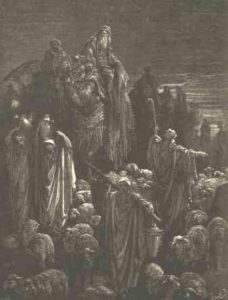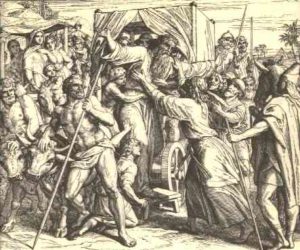Outline
God’s promises to Jacob. (Verse 1-4.)
Jacob and his family go to Egypt. (Verse 5-27.)
Joseph meets his father and his brethren. (Verse 28-34.)
1 And Israel took his journey with all that he had, and came to Beersheba, and offered sacrifices unto the God of his father Isaac.
2 And God spake unto Israel in the visions of the night, and said, Jacob, Jacob. And he said, Here am I.
[Gen 15:1]
3 And he said, I am God, the God of thy father: fear not to go down into Egypt; for I will there make of thee a great nation:
[Gen 12:2, Gen 17:6, Gen 18:18, Deut 26:5, 1st Kings 3:8]
there would have been some hesitation on Israel’s part to move down into Egypt as the land that God had promised to him and to his posterity was the land of Canaan that he was leaving. Thus we find God reassuring Israel in his move down into Egypt and the promise in verse four to surely bring the Hebrews back up out of Egypt into the promised land.
4 I will go down with thee into Egypt; and I will also surely bring thee up again: and Joseph shall put his hand upon thine eyes.
The comment about Joseph putting his hand upon Jacob’s eyes is a reference to the closing of someone’s eyes that dies while you were in their presence.
5 And Jacob rose up from Beersheba: and the sons of Israel carried Jacob their father, and their little ones, and their wives, in the wagons which Pharaoh had sent to carry him.

6 And they took their cattle, and their goods, which they had gotten in the land of Canaan, and came into Egypt, Jacob, and all his seed with him:
7 His sons, and his sons’ sons with him, his daughters, and his sons’ daughters, and all his seed brought he with him into Egypt.
8 And these are the names of the children of Israel, which came into Egypt, Jacob and his sons: Reuben, Jacob’s firstborn.
[Gen 35:23, Exod 1:2]
9 And the sons of Reuben; Hanoch, and Phallu, and Hezron, and Carmi.
10 And the sons of Simeon; Jemuel, and Jamin, and Ohad, and Jachin, and Zohar, and Shaul the son of a Canaanitish woman.
11 And the sons of Levi; Gershon, Kohath, and Merari.
12 And the sons of Judah; Er, and Onan, and Shelah, and Pharez, and Zerah: but Er and Onan died in the land of Canaan. And the sons of Pharez were Hezron and Hamul.
[Gen 38:4]
13 And the sons of Issachar; Tola, and Phuvah, and Job, and Shimron.
14 And the sons of Zebulun; Sered, and Elon, and Jahleel.
15 These be the sons of Leah, which she bare unto Jacob in Padanaram, with his daughter Dinah: all the souls of his sons and his daughters were thirty and three.
16 And the sons of Gad; Ziphion, and Haggi, Shuni, and Ezbon, Eri, and Arodi, and Areli.
17 And the sons of Asher; Jimnah, and Ishuah, and Isui, and Beriah, and Serah their sister: and the sons of Beriah; Heber, and Malchiel.
18 These are the sons of Zilpah, whom Laban gave to Leah his daughter, and these she bare unto Jacob, even sixteen souls.
19 The sons of Rachel Jacob’s wife; Joseph, and Benjamin.
20 And unto Joseph in the land of Egypt were born Manasseh and Ephraim, which Asenath the daughter of Potipherah priest of On bare unto him.
Notice again that Joseph took a gentile bride. Today in Israel they count a person Jewish only if the Mother is Jewish, how far they have come from their roots.
21 And the sons of Benjamin were Belah, and Becher, and Ashbel, Gera, and Naaman, Ehi, and Rosh, Muppim, and Huppim, and Ard.
22 These are the sons of Rachel, which were born to Jacob: all the souls were fourteen.
23 And the sons of Dan; Hushim.
24 And the sons of Naphtali; Jahzeel, and Guni, and Jezer, and Shillem.
25 These are the sons of Bilhah, which Laban gave unto Rachel his daughter, and she bare these unto Jacob: all the souls were seven.
26 All the souls that came with Jacob into Egypt, which came out of his loins, besides Jacob’s sons’ wives, all the souls were threescore and six;
27 And the sons of Joseph, which were born him in Egypt, were two souls: all the souls of the house of Jacob, which came into Egypt, were threescore and ten.
Seventy descendants of Abraham went down into Egypt to fulfill the prophecy that God had given to Abraham:
Genesis 15:13 And he said unto Abram, Know of a surety that thy seed shall be a stranger in a land that is not theirs, and shall serve them; and they shall afflict them four hundred years;
This wasn’t the greatest news for Jacob’s descendants, but it is what they deserved for their multitude of sins, especially for how they treated Joseph, the very image of the Messiah.
Remember how that on numerous occasions the brothers said we will be your (Egypt’s) slaves for their sin? This was soon to come to pass.
28 And he sent Judah before him unto Joseph, to direct his face unto Goshen; and they came into the land of Goshen.
“Goshen” – this is an area of northern Egypt where the Nile River begins to break into a delta before emptying into the Mediterranean Sea; it would have been a very fertile area and “prime real estate” in Egypt.
29 And Joseph made ready his chariot, and went up to meet Israel his father, to Goshen, and presented himself unto him; and he fell on his neck, and wept on his neck a good while.

30 And Israel said unto Joseph, Now let me die, since I have seen thy face, because thou art yet alive.
31 And Joseph said unto his brethren, and unto his father’s house, I will go up, and shew Pharaoh, and say unto him, My brethren, and my father’s house, which were in the land of Canaan, are come unto me;
32 And the men are shepherds, for their trade hath been to feed cattle; and they have brought their flocks, and their herds, and all that they have.
33 And it shall come to pass, when Pharaoh shall call you, and shall say, What is your occupation?
34 That ye shall say, Thy servants’ trade hath been about cattle from our youth even until now, both we, and also our fathers: that ye may dwell in the land of Goshen; for every shepherd is an abomination unto the Egyptians.
[Exod 8:26, Gem 43:32]
To the Egyptians, the most sacred animal was the cow; to sacrifice a sheep instead of a cow or to even keep sheep was an abomination to the Egyptians from a religious standpoint just as it was an abomination for the Egyptians to eat with people such as the Hebrews (43:32).
Israel knew exactly how long they would have to stay in Egypt and knew exactly when their deliverer would come to take them out. They didn’t recognize him (Moses) the first time either. See Acts 7:15 through the end of the chapter.
They also know they will spend seven years (the Seventieth Week of Daniel) in the wilderness before going into their kingdom.
Commentary by Matthew Henry, 1710.
Verse 1-4 – Even as to those events and undertakings which appear most joyful, we should seek counsel, assistance, and a blessing from the Lord. Attending on his ordinances, and receiving the pledges of his covenant love, we expect his presence, and that peace which it confers. In all removals we should be reminded of our removal out of this world. Nothing can encourage us to fear no evil when passing through the valley of the shadow of death, but the presence of Christ.
Verse 5-27 – We have here a particular account of Jacob’s family. Though the fulfilling of promises is always sure, yet it is often slow. It was now 215 years since God had promised Abraham to make of him a great nation, ch. 12:2. yet that branch of his seed, to which the promise was made sure, had only increased to seventy, of whom this particular account is kept, to show the power of God in making these seventy become a vast multitude.
Verse 28-34 – It was justice to Pharaoh to let him know that such a family was come to settle in his dominions. If others put confidence in us, we must not be so base as to abuse it by imposing upon them. But how shall Joseph dispose of his brethren? Time was, when they were contriving to be rid of him; now he is contriving to settle them to their advantage; this is rendering good for evil. He would have them live by themselves, in the land of Goshen, which lay nearest to Canaan. Shepherds were an abomination to the Egyptians. Yet Joseph would have them not ashamed to own this as their occupation before Pharaoh. He might have procured places for them at court or in the army. But such preferments would have exposed them to the envy of the Egyptians, and might have tempted them to forget Canaan and the promise made unto their fathers. An honest calling is no disgrace, nor ought we to account it so, but rather reckon it a shame to be idle, or to have nothing to do. It is generally best for people to abide in the callings they have been bred to and used to. Whatever employment and condition God in his providence has allotted for us, let us suit ourselves to it, satisfy ourselves with it, and not mind high things. It is better to be the credit of a mean post, than the shame of a high one. If we wish to destroy our souls, or the souls of our children, then let us seek for ourselves, and for them, great things; but if not, it becomes us, having food and raiment, therewith to be content.
